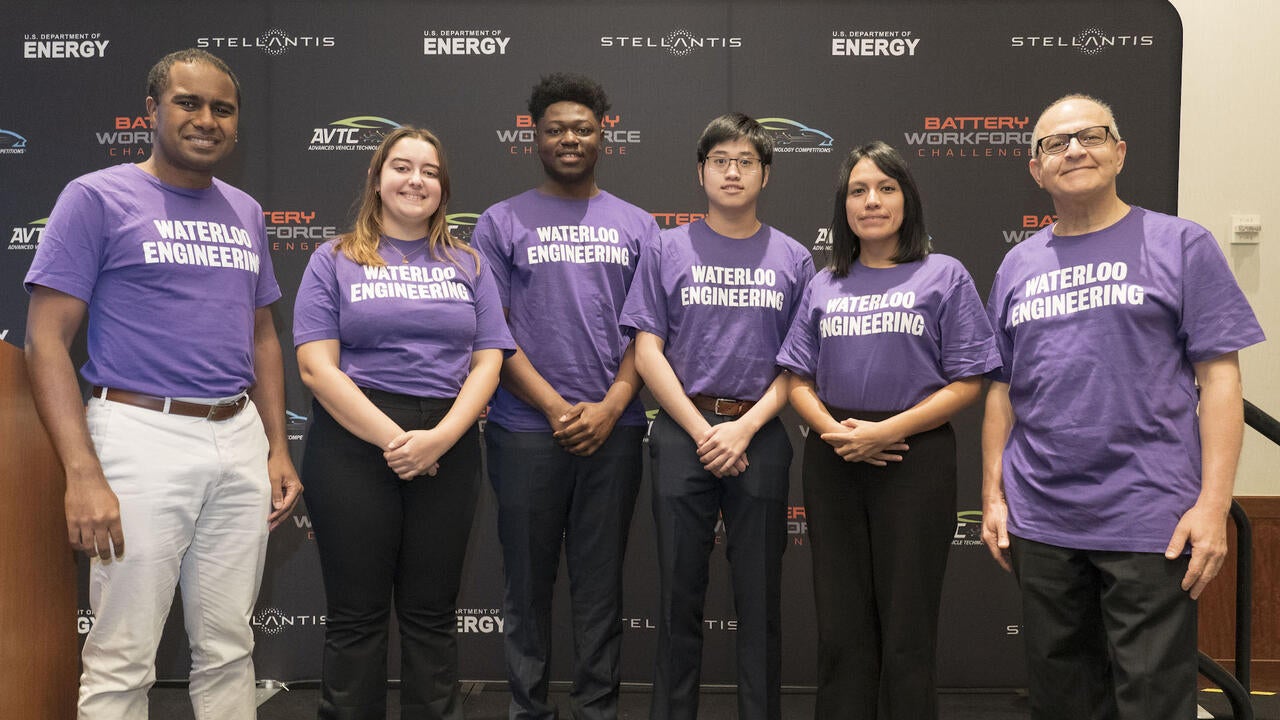
Students compete to advance EV power
Waterloo team takes on Battery Workforce Challenge to advance vehicle electrification

Waterloo team takes on Battery Workforce Challenge to advance vehicle electrification
By Nicola Kelly Faculty of EngineeringA team from the University of Waterloo has won a place in the Battery Workforce Challenge. It is a new three-year student competition that launches in fall 2023 to challenge universities from across North America to design, build, test and integrate an advanced electric vehicle (EV) battery pack in a Stellantis vehicle. The first year of the competition focuses on the design of the battery pack, the second year on the implementation of the design, and the final year on working to integrate the battery pack into a Stellanis vehicle.
The Battery Workforce Challenge is one of the U.S. Department of Energy’s (DOE) Advanced Vehicle Technology Competitions and is headline sponsoring with Stellantis for this competition. Brands such as Dodge, Fiat, Peugeot, Jeep, Chrysler, Citroen and Maserati fall under the Stellantis umbrella. The competition is managed by Argonne National Laboratory for the U.S. DOE.
The University of Waterloo team led by Professor Yverick Rangom, from the Department of Chemical Engineering, is one of two Canadian teams participating in this challenge. There are also ten competing teams from the United States. The University of Waterloo team is multidisciplinary and is collaborating with Lambton College to execute the requirements of the competition.
There are three components, or “swim lanes” in this competition. The first will rely on Rangom’s expertise in electrochemistry to determine the performance of the cell chemistry. Each team will be given thousands of lithium-ion battery cells, similar to the batteries found in laptops. The team must build a more than 500-kilogram battery pack. At this stage, the performance of each cell, temperature and state of charge must be evaluated.
“The goals of this competition align with the Faculty of Engineering’s and the Department of Chemical Engineering’s long-term vision to expand battery research from the smaller laboratory cells to the larger commercial cells that will be used here. The building of such a battery pack is also perfectly in line with my personal research goal,” says Rangom.
The second “swim lane” is the mechanical engineering of a thermal management design to create cooling and heating systems to combat battery cells heating up when in use and when charging. Temperature affects battery performance. Professor Xiao Yu Wu from the Department of Mechanical and Mechatronics Engineering is the team member leading this leg of the competition.
The third lane involves coding and will be spearheaded by Professor Mehrdad Kazerani from the Department of Electrical and Computer Engineering. Professor Michael Fowler from the Department of Chemical Engineering is the mentor of the project, having supervised both the Challenge X and EcoCAR competitions in the past. The team will work to achieve key performance indicators: efficiency, power, weight, charging time, and safety.
“Electric vehicles are the number one application of Li-ion batteries and their needs are therefore paramount in the research and development of this technology, says Rangom. “What we will be learning from Stellantis engineers and what they need to build the EVs of tomorrow will guarantee that the research I do in Waterloo will focus on what is important for the world and the future employment of our students.”
Both graduate and undergraduate students are an integral part of the team. This competition represents a significant opportunity for the students. Workforce is part of the title of the challenge because one of the aims is to train and develop a new workforce to fill future battery engineering and manufacturing jobs. Stellantis, the DOE and the Argonne National Laboratory are looking not only for innovative ideas but also for innovators to power their future workforce.
Feature image: Students and faculty representing the University of Waterloo in the Battery Workforce Challenge.

Read more
How Doug Kavanagh’s software engineering degree laid the foundation for a thriving career in patient care

Read more
Redefining capstone learning by bringing students, faculty and community partners together to tackle real-world challenges

Read more
Waterloo student launches Colare through co-op and entrepreneurship programs to reimagine recruitment for engineers
The University of Waterloo acknowledges that much of our work takes place on the traditional territory of the Neutral, Anishinaabeg, and Haudenosaunee peoples. Our main campus is situated on the Haldimand Tract, the land granted to the Six Nations that includes six miles on each side of the Grand River. Our active work toward reconciliation takes place across our campuses through research, learning, teaching, and community building, and is co-ordinated within the Office of Indigenous Relations.